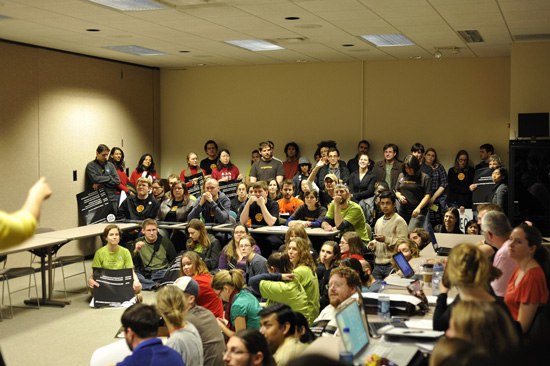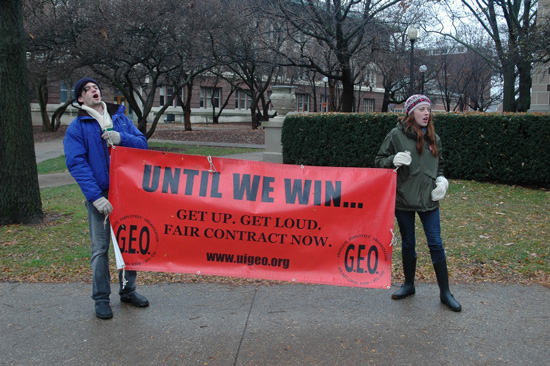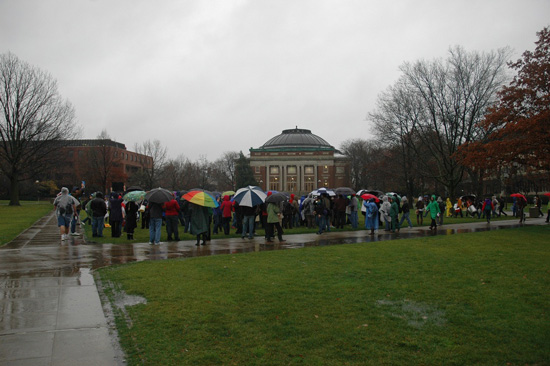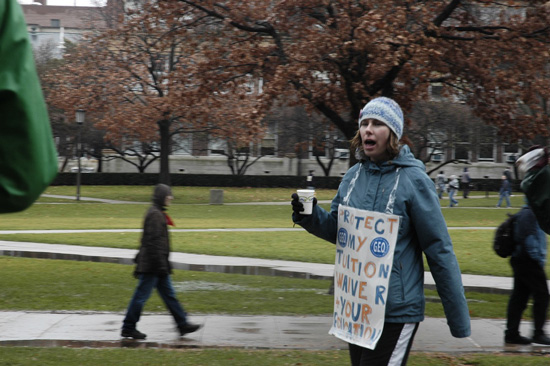Last November was unusually warm and sunny at the University of Illinois at Urbana-Champaign until the morning of November 16, when a crowd of graduate students sporting ponchos, rain boots, and GEO signs and buttons swarmed the main Quad in the chilly rain. It was almost 7:45 a.m., and very few of us were used to being on campus that early on a Monday, or on any day.
The 8 a.m. teaching times are hardly coveted. We had prepared for this, though, and would not have missed it: we had been exchanging e-mail and Facebook messages on where to find the best raincoats and ponchos, and what to bring for snacks (and figuring out where we might use the restroom); we knew to have T-shirts, buttons, and signs, but that nothing with sticks were allowed.

During this kick-off of the Graduate Employees’ Union (GEO) strike, we could hold umbrellas to shield ourselves from the icy drops, but those umbrellas would have to be folded when we broke into groups to picket the large campus buildings around the Quad. It should have come as no surprise to the administration or the local and statewide media that the graduate students turned out in such numbers under such conditions, and not just because of the lingering, “Yes we can” mentality from the Obama campaign, or the rebellious allure of standing up for ourselves during a time when so much in the current economic and academic environment seems out of control, and definitely out of our control.
Trouble brewing
Disseminated over the previous week, the plan was clear: The administration’s representatives would sit down for a bargaining session — the 19th over this contract — with GEO’s bargaining unit, lead by history graduate student Kerry Pimblott, the weekend before the pending strike, and should they not reach a tentative agreement, we would strike.
Despite its distance from campus, a few hundred graduate students gathered for a rally outside the Institute of Aviation at Willard Airport, and several dozen crammed into the negotiation room a very small lecture hall. The issues on the table were various, and they seemed to reflect the economic mood of the country in general, and the state of Illinois in particular: The key points of the contract aimed to preserve current labor opportunities and tuition waivers.

The ‘f’ word on everyone’s mind in late 2009 was furloughs — mandatory time off work without pay — which no other union on campus had been able to negotiate out of their new contracts, and perhaps this would be the stickiest issue to hammer out. However, by the end of the long evening at the airport during which an agreement was reached on increase in the university’s contribution to graduate student healthcare premiums, on parental leaves, on dropping furloughs from the proposed contract, and on gradual raises to the minimum salary, the final point of contention between the administration and GEO had become the contract’s language regarding tuition waivers. Presented by the administration as a non-issue, the security of tuition waivers supports the very ability of the university to attract top graduate students as well as the ability of the most talented and deserving students to pursue graduate education.
The debate seemed further complicated by the verbiage that GEO demanded clarified: The existing language did not explicitly guarantee the waiver of the entire tuition amount, only the base rate, and this posed a threat to the graduate students from other states as well as other countries whose rate of tuition could have jumped higher than the minimum salary, making graduate school simply unaffordable for many current students. We were happy with the advances our bargaining team had made, but there was no way that we would accept a compromise on tuition waivers.
There had been previous signs of trouble on that front: the university had considered eliminating tuition waivers for graduate students working the least hours as graduate assistants (and thus making the smallest salary); they had rescinded tuition waivers to undergraduate TAs in chemistry. For some this seemed like a petty point, and I heard more than one undergraduate complain about how graduate students already got paid to go to school, and now they insisted on free tuition as well. I did my best to explain how it all works, that we don’t in fact get paid to go to school, but to work. We teach over 23% of all the undergraduate classes at UIUC. I usually teach four classes a year, two each semester, and if I deducted my tuition from my annual pay, I’d be left with –$4,247.
The strike begins
So we kicked off the strike in the rain, and continued to picket in the rain all day. The lines consisted not only of graduate assistants but also their partners, former graduate students, non-tenure-track faculty, and professors. Further down the line from me was English professor Cary Nelson, the President of the American Association of University Professors, who had called graduate students and collective bargaining “the only hope for the universities of the future” the week before at a GEO rally.
We each marched during the shifts we’d signed up for, and I suspect that many of us spent time at the picket lines outside of those shifts, too. (We’d later Facebook about our various pains and aches, declaring it all worth it.) Facebook and Twitter updates about how the strike was going, sent from cell phones in picket lines, kept everyone informed, and the comments of encouragement and solidarity came not only from current students at UIUC and elsewhere, but from former graduate student workers as well whose leadership and hard work had created our labor union in the early 1990s, and whose efforts made these negotiations possible since the GEO was voted in as the official representative of graduate student labor at the University in 2003.

The second day of the strike dawned as rainy and windy as the first, but the picket lines remained strong and loud, with anticipation for new from the next bargaining session set for that morning. Looking around me, I saw perhaps even more enthusiasm than the day before. There was not just marching and chanting, but also singing and dancing.
Still, standing and walking around in the cold and the rain was getting to me a bit, but mostly because I felt misunderstood. While the campus newspaper was publishing accounts from both the administration and the GEO, but I was frustrated at what I called “the fear talk,” regarding the strike. After all, GEO had informed the media about the strike, and we’d all talked to our students about it ahead of time.
Yet the picketing itself and the empty classrooms were depicted as frightening: One headline for The Daily Illini answered valid questions about what undergraduate students might encounter during the strike in a piece that purportedly addressed “the rising fears about GEO strike” (none of my students or the students I saw walking by — and crossing — the picket lines seemed intimidated). Similarly, some undergraduates posted video they’d shot on their cell phones on the Quad. Seemingly enjoying themselves outside of class, one of the students laughs and she tells the camera that the “TAs” are being “loud” and “scary.” It was at times frustrating to see these students, of whose education we are such a crucial part, think of the strike as gratuitous. I hope, though, that seeing their teachers in the picket line and having to think about what that meant might have been useful higher education for some of the students.

By early afternoon, the news was spreading to suspend the strike and gather around the Foellinger Auditorium at the heart of campus to hear that GEO negotiated a side note guaranteeing the current tuition waivers for the duration of the contract and thus reached a tentative agreement. The celebratory crowd, with their banners, drums, and chants, had a few hours until GEO’s largest general membership meeting in its history came together to hear the details.
The strike was suspended, and over the three remaining days before the fall break, GEO members voted on ratifying the contract. It was strange how much we noticed being away from our respective buildings for just two days, but we were also happier than ever to be there. The dim halls of the English building sure seemed brighter Wednesday morning. I felt I had actually earned my right, in a more profound way, to work in that building. Walking across the street to the University YMCA to cast my vote felt like decompression after the intensity of the picket lines.
The after effects
Given how significant and controversial the strike was on campus, the attention to it among the general campus community seemed to wane rather quickly. Perhaps the tryptophan helped wash away the immediacy of the two-day strike over the Thanksgiving break. Only one of my students mentioned the outcome to me, as small talk when came to ask me about an assignment. But among the graduate students who picketed and had a hand in bringing about the best possible contract for us under current conditions, the effects of the strike lingered, and not just because our pay might have been docked to the tune of 50 bucks or so for the work missed during the strike.
We’re beginning to see the changes we have collectively worked for. As I write this, furloughs have resurfaced in the news over the past week or so, and it’s good to know we won’t face them even as we feel for those having to basically take a pay-cut under a slightly fancier verbiage. For some reason, the strike reminded me more than anything about the prospective graduate students I’ve shown around campus as they visited their potential new school.
We’d often talk about money, and where to live, and what grad school is really like, but we, the more experienced graduate students, talk about GEO. It might not register amid the whirlwind campus visits, but this one thing makes a world of difference. Our organized effort — the rallies and phone calls and meetings and activism of each of us, of those former grads who I barely remember from my first year — continues to make it possible for these new students to come here, and for them to show someone else around in their turn and tell them about the union that has helped them win a more fair contract.

- Follow us on Twitter: @inthefray
- Comment on stories or like us on Facebook
- Subscribe to our free email newsletter
- Send us your writing, photography, or artwork
- Republish our Creative Commons-licensed content

